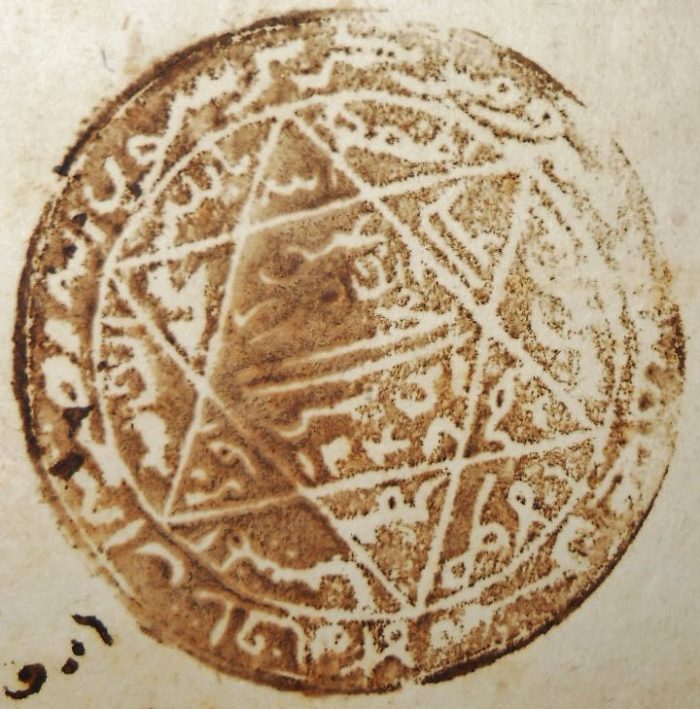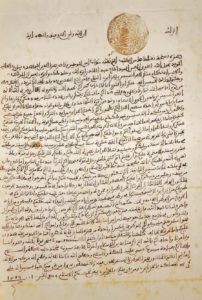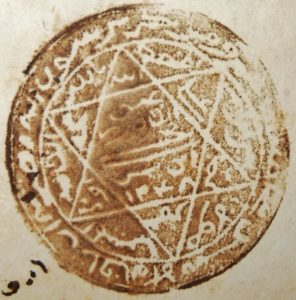Abd el-Kader [ عبد القادر بن محي الدين ] [Abdelkader ibn Muhieddine, called] (Mascara, 1808 – Damas, 1883]), Arab emir of Algeria, writer, poet, philosopher, military resistant, Sufi politician and theologian, founder of the Algerian state. Letter signed with his seal. No place, 10 of safer le bon 1256 (13 April 1840), to the Marshal [Valée] and the generals who command French troops in Algeria. 1 p. in-4°. Arabic text with its contemporary translation, signed and annotated by Franciade Fleurus Duvivier (1794-1848), General of Division, member of Parliament and writer, “pour traduction que je crois exacte “, 2 pp. and 1/2 in-4.
Precious letter characterised by chivalrous principles and holy war.
This writing, from the hand of a secretary, “copié d’après le registre qui nous a été envoyé par notre maître émir des croyans, vainqueur pour la loi, faisant la guerre sainte “, prelude to the fighting in Medea. The city had been subject to the authority of Abd el-Kader, who made all the preparations for a general attack, led by him, in November 1839, against the French settlements on the Mitidja plain. Aware of the disproportion between his troops and those of the French, the emir proposes a military settlement based on a sense of chivalrous honour worthy of Saladin during the Crusades.
Protected by God, Abd el-Kader does not fear French because “je suis celui qu’il a posé pour être le terme dernier de votre anéantissement, You, désignés pour être exterminés “, although his troops are only a third or even a quarter of their, less well-ordered, and much inferior in the art of war. Faced with the inequality of the forces, he makes four proposals :
1 He asks that the French will sell him war equipment “suivant ce que me permettront mes moyens ; j’armerai des soldats jusqu’à un nombre moitié du vôtre et alors nous en viendrons au combat “, or he proposes a non-aggression agreement for a period of 10 ., “mon règne accomplira ainsi vingt années et chaque année de mon gouvernement correspondra à cent années du vôtre, ensuite nous combattrons ” ; therefore, the French will have faced a strong man, and will take credit for it regardless of the outcome of the fight, ” mais maintenant si Dieu me donnait la victoire et si je l’emportais sur vous, ce vous serait une honte auprès des rois musulmans et chrétiens, tandisque si vous me vainquiez il n’y aurait nulle gloire pour vous, car vous auriez vaincu un homme qui n’en est qu’à la huitième année de son gouvernement. “
2 He proposes to fight one-on-two, “et je vous jure que je n’ajouterai pas un seul soldat “.
3 Or a singular battle between Marshal Valée and one of his lieutenants.
4 At last a singular fight between him and Henri d’Orléans, Duke of Aumale “Si vous voulez envoyer pour le combat singulier votre chef le fils du Roi [of French, Louis-Philippe], I, the slave of God, will fight against him. Si je sors vainqueur du combat, vous retournerez avec vos troupes dans votre pays ; vous abandonnerez toutes les villes qui sont [in] l’Etat ; vous ne vous en irez que de vos personnes, n’emportant que ce que vous avez individuellement acheté, – si je suis vaincu, ce sera fini de moi et il vous restera l’outann. “
He distrusts the word of the French . “Si vous acceptez une de ces propositions, il faut que vous convoquiez les grands des nations et que ceux-ci viennent se porter garans pour vous, quant à moi je ne manquerai pas à ma parole, je ne fausserai pas ma promesse. “
The emir finally invokes god’s protection. “Si vous me regardez comme trop faible, moi je suis fort par Dieu. Dieu est notre maitre à tous ; c’est lui qui dispense la victoire […] that, dans son amour nous a montré les traces de notre seigneur Mohammed […] tandis que vous autres vous êtes les serviteurs de notre seigneur Jésus […] qui avez divisé dieu en trois tiers et qui prétendez que Dieu est l’ensemble de ces trois, car vous parlez ainsi, (je You jure) que vous ne ferez jamais un mèlk (une propriété) de cet outann, que vous ne vous y établirez pas, que vous n’y stationnerez pas paisiblement et que si quelqu’un des vôtres survit, je le laisserai sur un trône à Alger et que l’Islam passera sous le commandement de ce survivant. “
From 27 April 1840, French army will fight several battles against Arab cavalry, will devastate the Establishments of the Hadjouths, destroying their harvests and will unlock Cherchell who was assaulted by Kabyles.
On 12 May 1840, the 1st division commanded by the Duke of Aumale and formed in 3 columns ordered 1st by General Duvivier, the 2th by Colonel Lamoricière and the 3th by general of Houdetot, will cross the Mouzaïa pass, after capturing all the redoubts of enemies. Duvivier had took out, at the head of his brigade, the most difficult position, the passage of Téniah. Charged with occupying Medea, he had engaged 900 French against 5 000 Arab, commanded by the Emir and killed 500 of them. Medea will finally be taken over on 17 May.
Few foxing. Exceptional document.
Sold



